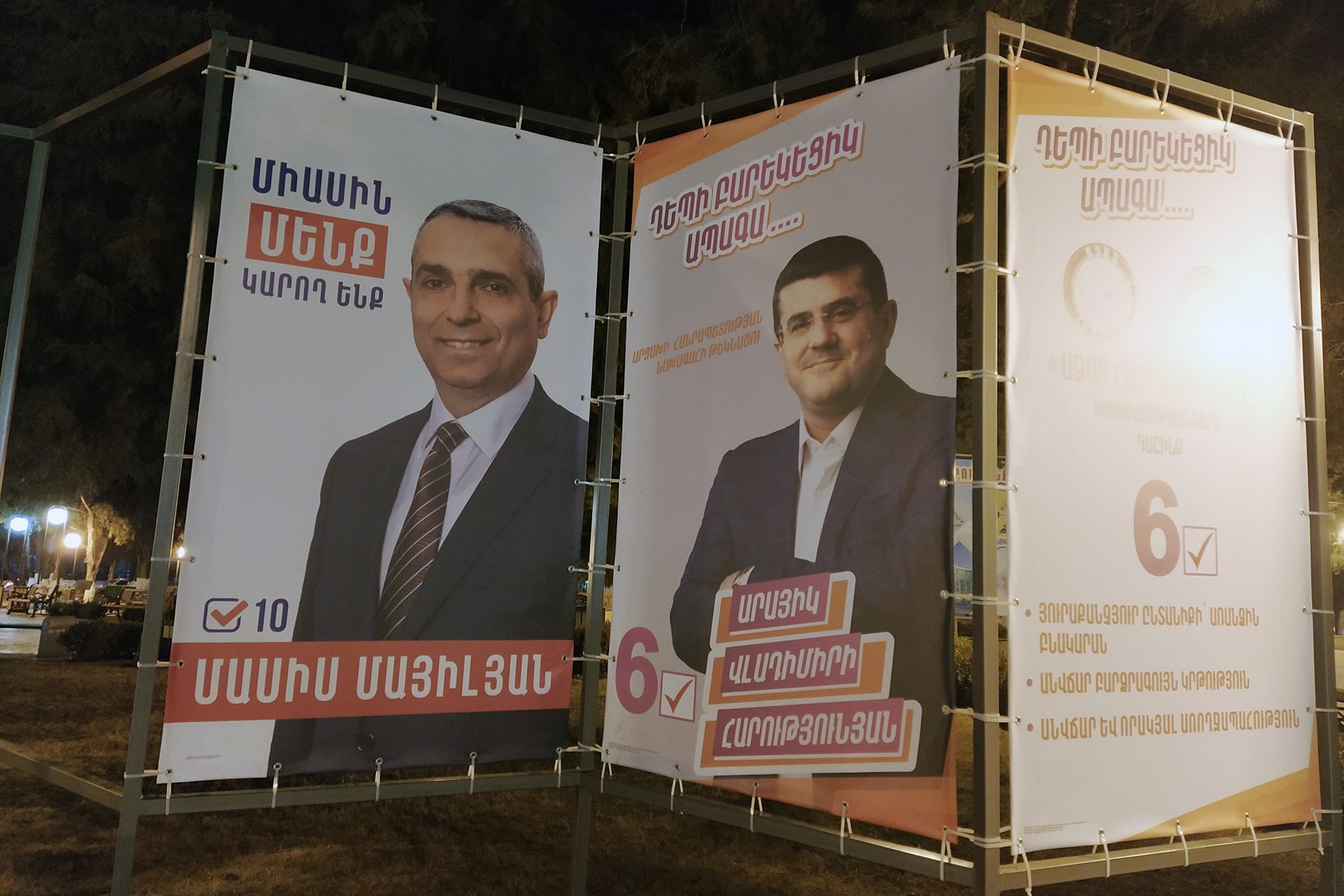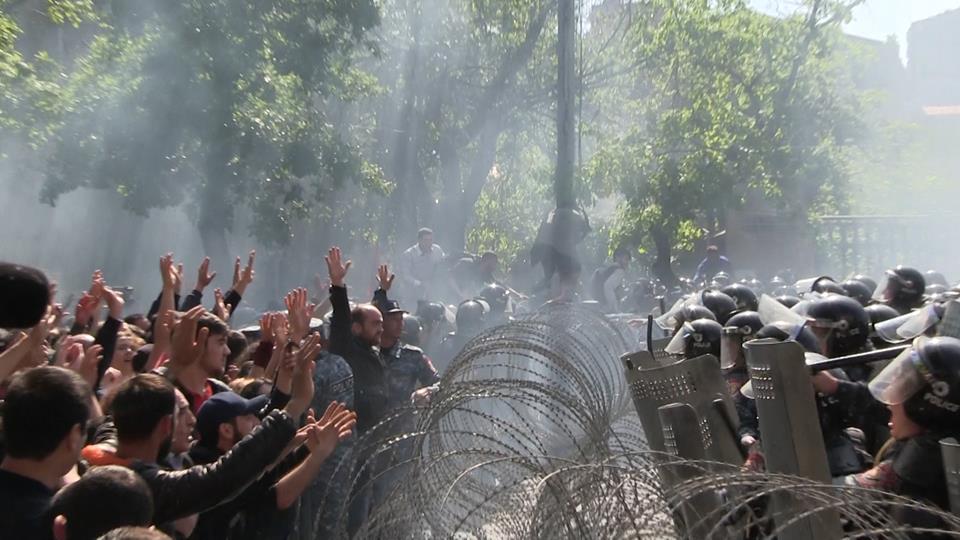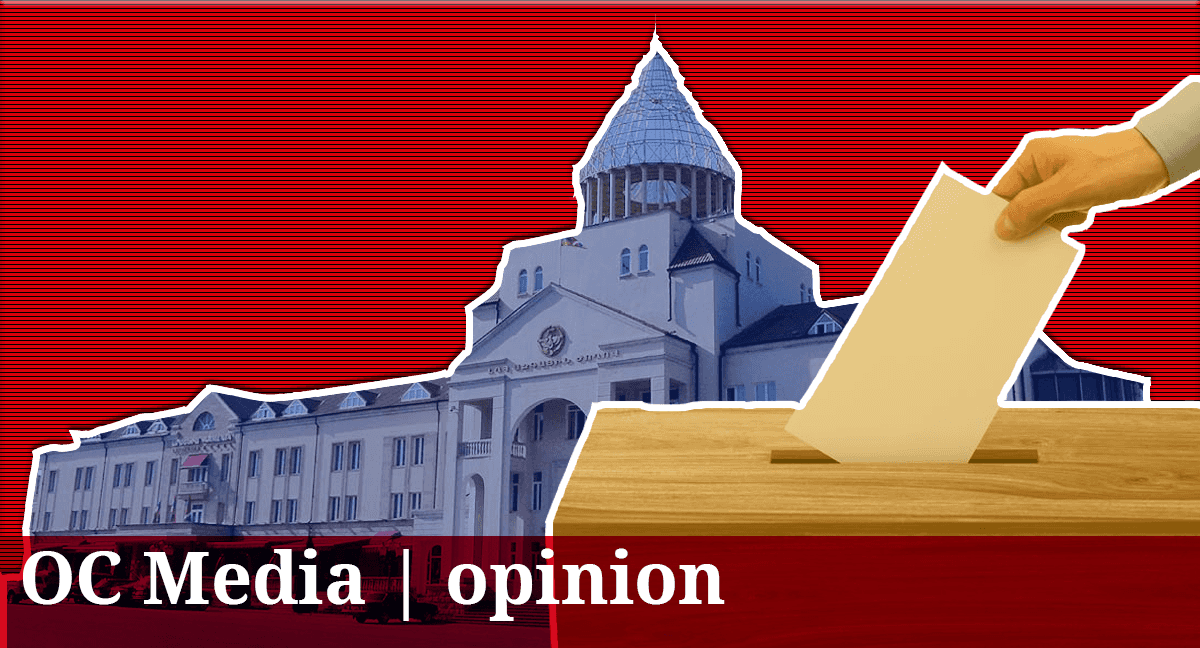
Elections held in Nagorno-Karabakh yesterday have yielded inconclusive results, with no party gaining a majority in parliament and the presidential elections set to go to a second round.
The elections were the first combined presidential and parliamentary elections in Nagorno-Karabakh, following a referendum in 2017 to change the constitution.
Former Prime Minister Arayik Harutyunyan of the Free Motherland Party fell just short of the required 50% of votes to win the presidency outright, gaining 49%.
There has been widespread speculation that Harutyunyan is Armenian Prime Minister Nikol Pashinyan’s first choice for the post, though Pashinyan has not expressed support for any candidate.
He will now face Foreign Minister Masis Mayilyan, who came second with 26%. According to the constitution, the second round will take place on 14 April.

Five parties will have seats in Nagorno-Karabakh’s 33-seat parliament, the National Assembly. Parties were required to win at least 5% of the vote to qualify for seats while party alliances required at least 7%.
The Free Motherland-United Civic Alliance Party alliance headed by presidential frontrunner Arayik Harutyunyan won the most seats, 16, with 39.7% of the popular vote. This was one seat short of the number required to form a majority government.
In a press conference on 1 April, Harutyunyan announced that they were ready to talk with other parties to form a coalition.
‘We are going to collaborate with those parties that are ready to take on the socio-economic development and security agenda of Artsakh[Nagorno-Karabakh]’, Harutyunyan said.
‘There is one important condition, that is Artsakh is Armenia, the end. The only issue around which there can be a dispute is the Nagorno-Karabakh conflict, and, thank God, today there are no disputes at least between our political team and the Armenian authorities.’
The United Homeland Party received the second most seats, nine, with 23.8%.
The party’s list was headed by Gagik Baghunts, an MP from the Movement 88 Party, which is a part of the Free Motherland-United Civic Alliance Party alliance.
The Justice Party of Artsakh headed by presidential candidate Vitali Balasanyan received 3 seats with 8%.
The Armenian Revolutionary Federation headed by presidential candidate Davit Ishkhanyan received 3 seats with 6.4%.
Finally, the Democratic Party of Artsakh headed by Parliamentary Speaker Ashot Ghulyan received 2 seats, with 5.7%.
Despite the global coronavirus pandemic, official turnout remained high at 72.7%, compared with 73.5% during 2012’s presidential vote.
Unprecedented elections
The elections were unprecedented for Nagorno-Karabakh in many ways.
They saw the first women running for president — independent candidates Kristin Balayan and Bella Lalayan.
The elections also saw the youngest ever presidential candidates — 38-year-old Melsik Poghosyan and 36-year-old Ashot Dadayan, both independents.
Two blocs and ten parties presented lists to participate in the parliamentary elections, and 14 candidates ran for president. Six of the presidential candidates ran as independents.
Eight presidential candidates were also listed first on their parliamentary candidate list, meaning three of them — Vitali Balasanyan, Davit Ishkhanyan, and Ashot Ghulyan — will now sit as MPs.
A post–Velvet Revolution election
The elections were also unprecedented because they were the first to be held since the 2017 constitutional referendum turned the country’s governmental structure from a semi-presidential to a fully-presidential one.
The parliamentary elections also became fully-proportional, instead of the semi-proportional, semi-majoritarian system in place prior.
Since the expiration of outgoing President Bako Sahakyan’s second term and the next parliamentary elections did not coincide, Sahakyan served an additional three years after his term ended in 2017 until parliamentary elections were due in 2020. This decision was ratified by parliament in July 2017.
The new constitution also allowed Sahakyan to run again for president, despite the two-term limits for the presidency.
This led to accusations that the constitutional changes, which were authored by Armenia’s Constitutional Court Chair Hrayr Tovmasyan, were enacted only to allow Sahakyan to extend his hold on the presidency.
Similar accusations were levelled against former president of Armenia, Serzh Sargsyan. Amendments to the Armenian constitution passed in 2015 changed Armenia from a presidential system to a parliamentary one.
Sargsyan, having served the maximum two terms as president, was then appointed Prime Minister.
The move was the immediate trigger for the 2018 Velvet Revolution, which saw Sargsyan resigning after serving only a week as PM.

Despite Sahakyan being expected to run again in the 2020 elections, on 11 June, he announced that he would not be running.
Other major changes to Nagorno-Karabakh’s political landscape since the Velvet Revolution saw a string of resignations of top security officials in the summer of 2018.
These included the director of Nagorno-Karabakh’s National Security Services, Chief of Police, and State Minister (former PM and presidential candidate Arayik Harutyunyan) resigned from their posts.
Calls for a postponement
The elections were marred with controversy due to the spread of the COVID-19 pandemic in the region and around the world.
Armenia, with which Nagorno-Karabakh shares its only open border, declared a state of emergency on 16 March. The country had confirmed a total of 532 cases and three deaths by the day of the election.
Several countries around the world have postponed national votes as a result of the coronavirus. These include France, Russia, Switzerland, and Armenia, which postponed a constitutional referendum scheduled for 5 April.
On 23 March, the Revolutionary Party of Artsakh, which was running for parliament, held a demonstration demanding the vote to be postponed and for President Sahakyan to resign.
Five presidential candidates — Ruslan Israelyan, Masis Mayilyan, Sergey Amiryan, Kristin Balayan, and Ashot Dadayan — issued a joint statement calling for the authorities to declare a state of emergency and postpone the vote.
Other candidates argued that the elections must take place.
In an interview with Azatutyun, presidential frontrunner Arayik Harutyunyan argued that it was unclear when the pandemic would end and that a political transition should take place as soon as possible for the new elected leaders to address the challenges the virus would bring.
Another candidate, Davit Babayan, the President’s Press Secretary and Deputy Chief of Staff, told Azatutyun that delaying the election could lead to a constitutional crisis.
According to Babayan declaring a state of emergency would only extend Sahakyan’s mandate which is already three years past his two-term limit. He warned that people would try to politically manipulate the situation.
There were 140 international observers from 38 countries registered to take part. However, on the day, only observers from Armenia and Nagorno-Karabakh were able to take part due to restrictions on foreigners entering Armenia.
Observers from Armenia were allowed to enter Nagorno-Karabakh only after testing negative for the novel coronavirus.
Several observation missions also expressed concerns about the election not being postponed, including the Armenian branch of Transparency International and the Union of Informed Citizens.
Several measures to prevent the spread of the virus were implemented leading up to and during the election.
These included closing the border with Armenia except for local residents and election observers, shutting down schools and other cultural centres and events, placing hand sanitiser at the entrances of markets and in public transport, and designating hotels for quarantine in the event cases are confirmed.
Candidates also cancelled in-person campaign programmes for several days leading up to the elections, and some only held meetings with voters in smaller groups outside.
The Central Electoral Commission (CEC) announced a number of preventative steps they were taking during the campaign, including holding meetings and training sessions online, providing poll workers with masks and disinfectants, and disinfecting polling stations.
On the day of the election, 80,000 masks and pairs of gloves were distributed to voters, and people were allowed to enter to vote three at a time and were given their own pens to cast their votes.
After coming out on top in the first round of the presidential election, Harutyunyan announced that he would not hold meetings during the second-round campaign.
‘Let the authorities evaluate the situation and understand how they’re going to organise it,’ said Harutyunyan. ‘The Artsakh voter is already decided and we don’t have much to do in that sense.’
For ease of reading, we choose not to use qualifiers such as ‘de facto’, ‘unrecognised’, or ‘partially recognised’ when discussing institutions or political positions within Abkhazia, Nagorno-Karabakh, and South Ossetia. This does not imply a position on their status.






